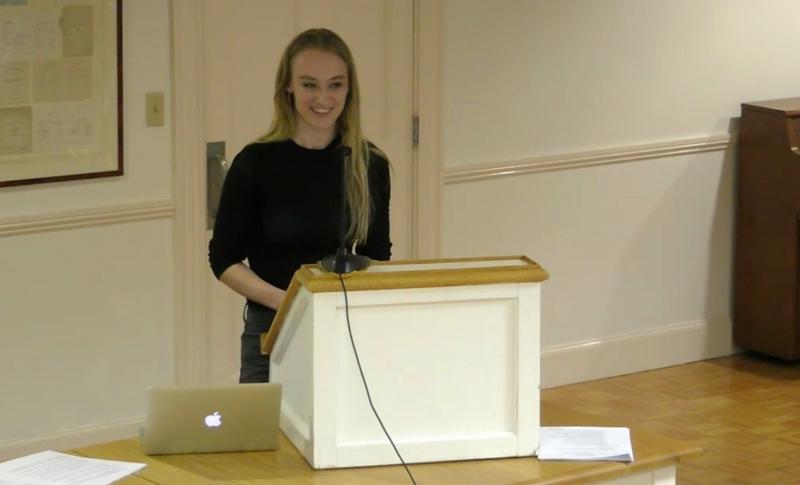Rockport pursues polystyrene takeout container, cup ban
ROCKPORT — Upon the recommendation of Camden Hills Regional High School senior Fran Woodworth, the Town of Rockport is joining its neighbors to the north and south in pursuing the ban of polystyrene takeout containers within municipal borders.
At their regularly scheduled meeting March 13, Rockport Select Board members agreed to advance a proposed ordinance amendment that puts a ban “on the use of Expanded Polystyrene Foam in situations involving takeout food or beverages” before the town attorney for review, in preparation for public hearings and eventual placement on a town meeting warrant. (Click here to watch the meeting)
Proposed ordinance language
Ban on Use of Expanded Polystyrene Foam for All Takeout Food and Beverage Businesses Ordinance
The Code of Ordinances, Town of Rockport, Maine, is hereby amended to add an additional article as follows:
Ban on the use of Expanded Polystyrene Foam in situations involving takeout food or beverages.
Section 1. Purpose of the Article
- The Town has a duty to protect the natural environment; and
- Expanded Polystyrene Packaging has a harsh environmental impact on a local and
- and global scale, including greenhouse gas emissions, litter, and harm to wildlife;
- It is in the best interest of the citizens of Rockport to protect the environment and
- natural resources by prohibiting the distribution and use of disposable Expanded Polystyrene cups, plates, bowls, coolers, and food containers and to require the use of food containers made of other materials associated with all takeout foods defined in this section; and
- The Town through its policies, programs, and laws supports efforts to reduce the environmental impact of waste by supporting the State waste management hierarchy to reduce, reuse, recycle, compost, and landfill.
Section 2. Definitions
As used in this Ordinance the following terms have the following meanings:
Expanded Polystyrene packaging means any containers, including coolers, that are made of expanded polystyrene foam and used to package both food and beverage for both onsite and offsite consumption. It does not include Expanded Polystyrene meat trays or other Polystyrene packaging used to transport raw and/or uncured meat, poultry, and fish from all food stores.
Store means all retail establishments, including but not limited to convenience stores, restaurants, sellers of food merchandise sold to the ultimate consumer for direct use or consumption and not for sale.
Section 3. Violations and Enforcement
The Town Manager and his/her designee(s) shall have the primary responsibility for the enforcement of this Ordinance. For the first six months following the implementation of the Ordinance, the Town Manager shall issue verbal warnings to Stores in violation of the Ordinance. Following this six month period, if the Town Manager and his/her designee(s) determine a violation of this article has occurred, he/she shall issue a written Notice to the Store and request compliance with this Ordinance within ten days of the issuance of the Notice. Subsequent violations after the initial warning Notice shall be subject to the penalties put forth below.
Violations of this Ordinance shall be punishable by fines and reimbursed legal fees as follows:
1. A fine not exceeding $250 for the violation for each year of noncompliance; and
2. Reimbursement of the Town’s legal fees and costs for prosecution of each violation.
Section 4. Permitted Expanded Polystyrene containers
Nothing in this Article shall be construed to prohibit customers from using containers of any type that the customer owns.
Customers will not be in violation if they bring their own container of any type to use in carrying away food from the Store.
Section 5. Effective Date
The provisions of this Ordinance shall become effective on January 1, 2019.
It is too late to get on the 2018 June Meeting Town Warrant, said Select Board Chairman Ken McKinley, but the town could target November, or even a special town meeting, should other articles arise, he said.
The Rockport Ordinance Review Committee listened to a presentation from Woodworth last week about the proposed amendment, which prompted McKinley to invite her to to the Select Board meeting.
Polystyrene containers, more commonly known as Styrofoam, are molded beads of plastic that provide durable transport of hot food and liquid. The material has been used as packing material — peanut foam — and it is cheaper to manufacture than other plastics and paper goods used for the same purposes.
But when polystyrene breaks down, it doesn’t decompose. It converts back to those little plastic beads. Animals — birds, fish, turtles — ingest it, and they die. It fills earth and water with plastic, and takes hundreds of years, perhaps longer to break down, unless it is incinerated. And there is no recycling market for it.
“It gets into waterways and causes lethal blockages in animals’ intestines when ingested, and also acts also like a pollutant sponge, so it picks up and concentrates contaminants in the water before being ingested by animals,” said Woodworth, speaking to the Select Board.
Municipalities around the country began banning its use by commercial operations; in 2015, New York City banned it, followed by Seattle, Miami Beach, Washington, D.C., Portland and Freeport, Maine, Antarctica, and more.
Woodworth, who is getting ready to graduate and head for college, perhaps to study environmental policy or law, said she is intent on ridding the environment of Styrofoam litter. She has volunteered on the biannual Rockport roadside clean-up crews, helping to clear trash from the sides of the streets.
“People throw their Styrofoam cups and litter out the window all the time and they are hard to pick up,” she said. “And we know that they are not biodegradable.”
Woodworth researched the environmental, social and business effects of such a ban, interviewing town and city managers, as well as business owners and managers of restaurant and coffee shops that use or have used Styrofoam.
Woodworth said the ordinance research and preparation is an academic project for her. She is working toward a Global Competency Endorsement, “where I need to pick an issue of global significance and research it, and take action around it.”
That endorsement is not part of a class at Camden Hills, but an independent pursuit of a graduation endorsement that, "certifies that the individual student has the capacity and disposition to understand and act on issues of global significance,” she said, citing the requirements.
Woodworth said the only proper way for Rockport, and the three other towns that comprise Midcoast Solid Waste Corporation — Camden, Hope and Lincolnville — to dispose of polystyrene is to incinerate it.
In April 2018, the trash of the four towns will travel to ecomaine, in southern Maine, “which does an amazing job of minimizing the environmental impact of what they incinerate.”
But she wants to keep Styrofoam from getting tossed out the windows of cars and trucks. She noted that Rockland and Camden are pursuing their own bans (Rockland City Council approved such a ban at its March 12 meeting and Camden’s Conservation Commission is currently seeking feedback from citizens about that town’s proposed ordinance language.)
Woodworth said she called city managers in Portland and Belfast, which has polystyrene ordinances and concluded that Portland has had no issues since it enacted new laws in 2015. Belfast reported, according to Woodworth, that it has worked well, with a few businesses that required compliance action.
She also said: “In my research I talked to the majority of places in Rockport that sell food to see if they use Styrofoam or not, most places either don’t use it or have just one or two cup sizes that are Styrofoam. So the place that would be probably most impacted by this ban would be Dunkin Donuts, which uses a lot Styrofoam for their coffee cups, but they’ve already made a company wide pledge to go Styrofoam-free by 2020, and they’re starting to phase it out right now in the spring of 2018.”
Woodworth said that after talking to business owners and managers, she learned that: “Most food places in general do pay more for packaging, but not enough to need to raise their prices. And all the businesses that I talked to said that the financial impact of switching their packaging hasn’t been anything they can’t handle. They said the switch to other kinds of packaging is more of an inconvenience than anything else. So they weren’t complaining about an economic impact, they were saying the containers they use now are smaller or don’t insulate as well....”
There was no opposition by the four Rockport Select Board members — Chairman McKinley, Doug Cole, Owen Casas and Mark Kelley — to move Woodworth’s ordinance language for legal review.
Town Manager Rick Bates asked about the styrofoam cups that also are coated with paper, and whether they would fall under the same ordinance.
“I’m not sure what it is,” said Woodworth.
Woodworth’s advisor, Marci Casas, said the Rockport Conservation Commission has investigated that particular coffee cup material and said it remains “up for debate.”
Bates conceded that it makes sense to focus on the polystyrene takeout containers and cups, to “take the most obvious litter problem and focus on that.”
“I’ve had the opportunity over the last several months to work with several of our high school students from the environmental cleanup crew,” said Select Board member Cole. “And then hearing Fran’s presentation tonight, I must tell you I’m terribly impressed with this group of students coming through now. When I think back to my high school days, you wouldn’t see me standing up doing this sort of thing.”
He commended the students on the cleanup crew and those helping with the Keep Rockport Beautiful work.
McKinley echoed those sentiments.
The board then questioned whether the $250 penalty fee for not complying with the ordinance was sufficient, and agreed it could be raised.
Bates said it would be important to earmark any penalty fines paid to the town’s cleanup efforts.
He also encouraged the board to commend those Rockport businesses that are making the packaging changes now.
“I would encourage all of us to say thank you,” said Bates.
Styrofoam in Rockport
By Fran Woodworth
Polystyrene, or styrofoam, is a convenient and relatively cheap packaging material— but its environmental impact isn’t worth the costs it saves businesses. Not only is its production energy intensive, it never biodegrades; and because it’s often littered, it gets into waterways and harms birds and marine animals.
Environmental problems:
- Styrofoam, made from the non-renewable substance petroleum, uses carbon dioxide and pentane in its production, which damage the ozone layer.
- It is resistant to photolysis, or the breaking down of materials by photons originating from a light source. The pieces get smaller and smaller, but they never biodegrade.
- It is often littered because it is used for takeout food, and because it’s 95 percent air, it blows around easily. It gets into waterways causes lethal blockages in animals’ intestines when ingested, and also acts also like a pollutant sponge, picking up and concentrating contaminants in the water before being ingested by animals.
- There are no facilities in our community that recycle styrofoam, as there is almost no market for polystyrene beads that have already been expanded. When properly disposed of in your household trash, polystyrene is incinerated and converted into energy. Removing styrofoam from the environment prevents the poisoning and starvation to wildlife.
According to Keep Rockport Beautiful, which has facilitated six roadside cleanup events and picked up more than 5,000 pounds of trash off of Rockport roadsides, the Styrofoam that doesn’t make it to the trashcan is primarily takeout food packaging. It is nearly impossible to pickup because it breaks into tiny pieces. Maine State Polystyrene Ban History: Several communities in Maine have implemented polystyrene bans to differing degrees.- The state of Maine banned the use of Expanded Polystyrene for serving individual portion of food or a beverage at a facility or function of the State.
- A ban on this kind of packaging would have a minimal economic burden on our businesses, while maximizing environmental benefits.
- The Rockport Conservation Commission voted unanimously to support my efforts to minimize styrofoam litter with an Expanded Polystyrene Foam ban for the town of Rockport.
- Solutions:
Freeport: January 1, 1990.
Brunswick: October 1, 2016.
Portland: April 15, 2015.
South Portland: March 1, 2016.
Saco: October 19, 2016
Topsham: May 7, 2017.
Cape Elizabeth: December 6, 2017. Belfast: January 1, 2018.
Bath: April 22, 2018.
Rockland: March 12, 2018
Camden is working on polystyrene ban, as well.
Related stories
Rockland passes single-use plastic bag, Styrofoam ban
Rockland bag ban: Fee fairness differs as solutions assessed
Camden Conservation Commission seeks feedback on proposed bag, polystyrene container ordinances
Proponents, opponents debate proposed Rockland plastic bag ban
Proposed Rockland bag ordinance combines bans, fees, conservation
Belfast bans single-use plastic bags, Styrofoam takeout containers
Belfast moves to reduce plastic bag waste, considers ordinance language
Rockland hears call for ban on single-use plastic bags
Reach Editorial Director Lynda Clancy at lyndaclancy@penbaypilot.com; 207-706-6657
Event Date
Address
United States
























